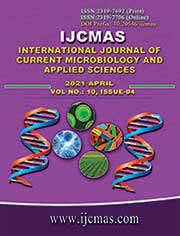


 National Academy of Agricultural Sciences (NAAS)
National Academy of Agricultural Sciences (NAAS)

|
PRINT ISSN : 2319-7692
Online ISSN : 2319-7706 Issues : 12 per year Publisher : Excellent Publishers Email : editorijcmas@gmail.com / submit@ijcmas.com Editor-in-chief: Dr.M.Prakash Index Copernicus ICV 2018: 95.39 NAAS RATING 2020: 5.38 |
Enzyme Immobilization favours operational stability, reuse, easy separation and enhanced stability than free enzyme. Lipase from Lysinibacillus macroides FS1 was entrapped into Ca-alginate gel beads and effect of independent variables such as alginate concentration of 1-4% (w/v) and CaCl2 concentration of 50-200mM on immobilization efficiency and activity were investigated. After optimization of immobilization conditions, maximum immobilization efficiencies of 69% and activity of immobilized lipase was 6.0 U/ml were recorded at optimum concentrations of 4% (w/v) sodium alginate and 200mM CaCl2. The optimum temperature of both free and immobilized lipase was 45°C and optimum pH of free and immobilized lipase was pH 5 and 8 respectively. The lipase activity of 46% was recovered by immobilized lipase after 6 cycles of reusability. Stability studies revealed that immobilized lipase was more stable than free lipase at optimum pH (8) and temperature (45°C) when incubated for 3 hr. Furthermore, the immobilized lipase showed enhanced stability to methanol than ethanol compared to free lipase. The biodiesel was produced by using immobilized lipase and it was confirmed by glycerol assay. These findings advise the efficient and sustainable use of the developed immobilized lipase as a biocatalyst for production of biodiesel.
 |
 |
 |
 |
 |